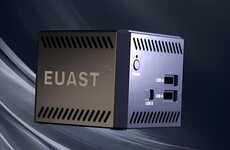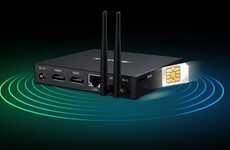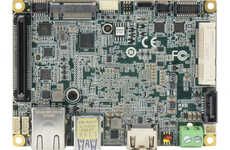
The 'Endless Mini' Launched at CES 2016 Introduces Accessible Computing
Laura McQuarrie — January 9, 2016 — Tech
References: endlessm & digitaltrends
After launching 'Endless,' a powerful globally minded machine, Endless Computers launched the 'Endless Mini' at CES 2016 as an affordable equivalent.
Available for less than $100, the Endless Mini is a desktop computer with a helmet-shaped design that contains an AMLogic quad-core ARM Cortex A5, a 1.50GHz Mali-450 GPU and at minimum, a 24GB solid state drive with 1GB of RAM. What's most significant about this computer is that it uses a CPU that's typically used in mobile devices, rather than desktop models. In place of using an operating system from Windows or Apple, the computer uses its own Linux-based system, complete with more than 100 apps.
In addition to being a computer that many tech enthusiasts can look forward to using, the Endless Mini is set to be an affordable option for people in developing countries.
Available for less than $100, the Endless Mini is a desktop computer with a helmet-shaped design that contains an AMLogic quad-core ARM Cortex A5, a 1.50GHz Mali-450 GPU and at minimum, a 24GB solid state drive with 1GB of RAM. What's most significant about this computer is that it uses a CPU that's typically used in mobile devices, rather than desktop models. In place of using an operating system from Windows or Apple, the computer uses its own Linux-based system, complete with more than 100 apps.
In addition to being a computer that many tech enthusiasts can look forward to using, the Endless Mini is set to be an affordable option for people in developing countries.
Trend Themes
1. Affordable Mini Computers - The rise of affordable mini computers that use mobile device CPU instead of desktop models opens opportunities for disruptive innovations such as developing new operating systems.
2. Linux-based Systems for Desktops - The increasing use of Linux-based systems for desktop computers provides opportunities for disruptive innovation in software development.
3. Computing for Developing Countries - The introduction of affordable computing options for developing countries creates disruptions in the global market and opens up new opportunities for businesses to address the unique needs of these markets.
Industry Implications
1. Technology - The technology industry can capitalize on the trend of affordable mini computers by developing new hardware and software for these devices.
2. Education - The education industry can benefit from the rise of affordable computing options by providing access to these devices to students in developing countries to enhance their learning.
3. Non-profit - Non-profit organizations can leverage the trend of affordable computing to provide access to technology and education in underserved communities.
3.6
Score
Popularity
Activity
Freshness























